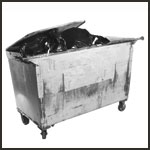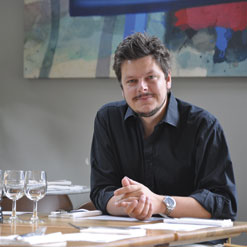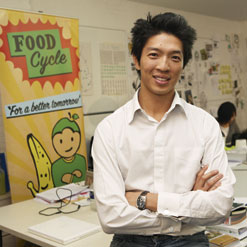Can restaurants afford not to be sustainable?
With landfill costs soaring, this year could prove to be the tipping point that makes sustainable practices a business imperitive. Emily Manson asks what measures operators can take to turn waste into wealth
Is it really financially viable to run a sustainable restaurant? That's the question many restaurateurs ask themselves. But, with the forthcoming increases in landfill tax, the possible imminent ban on all food waste to landfill and rising customer demand for environmentally aware dining options, should the question really be; is it financially viable not to run a sustainable restaurant?
Mark Linehan is managing director of the Sustainable Restaurant Association (SRA), which was formed last year to provide a one stop shop to help restaurants become sustainable. He says restaurants can do a lot to contribute to the environment, but they need a financial incentive. "They'll do it because it makes sound commercial sense, either by bringing in customers or by eradicating waste that is costing the business unnecessary cash," he adds.
Linehan cites the SRA's research which found last year that 66% of restaurant consumers didn't think restaurants did enough to tackle sustainability and 70% would be more likely to dine in a restaurant if it was sustainable. This, he says, is progress. "Up till recently, people would buy ethically for their home but saw dining out as an exception. This is now changing and having clear quantifiable environmental credentials is becoming an increasingly common expectation."
There's also the issue of waste and use of resources. Separate SRA research found that on average a restaurant will throw away the food equivalent in weight to a London Routemaster bus per year. "The food waste comes from three main areas: stock wastage, preparation processes and portion sizes," says Linehan. "Restaurants need to consider different portion sizes and doggy bags, like in the US."
The SRA is also confident kitchens can reduce 25% of their energy consumption just by applying basic principles such as turning ovens down, appliances off, using LED light bulbs and loading dishwashers fully.
On the waste front, landfill is now the most expensive option. With a 20% increase in landfill costs on its way over the next few years (see box), this is only going to get worse. Recycling is now the cheaper option. It's also likely that in 2012 food waste will be banned from landfill, so it makes sense to plan ahead and ensure your operation is prepared.
Joe Frankel, managing director and founder of Vegware, a packaging manufacturer with a completely compostable range of goods for the restaurant industry, believes this year will be the tipping point for catering waste. "From April onwards, organics recycling will be cheaper than landfill. That means that more sustainable alternatives have now become the cheaper option, as well as being far better for the environment," he says.
He argues that caterers no longer need send any waste to landfill. There are many new organics recycling facilities coming online over the coming year, so increased competition should push charges down further. All in all, organics recycling of food and compostable packaging will be not only environmentally sustainable, but financially sustainable too.
"Caterers could be recycling everything," says Frankel. "Food, compostable packaging, plastics, tins, cans, paper, cardboard, ink cartridges, it's only really crisp packets and laminated paper which are trickier, as there is no market value for the end product. The one big general bin is now only for environmentally irresponsible caterers with more money than sense."
Businesses can divert waste from landfill relatively simply using a three-bin system: compostables (food waste, compostable packaging), dry recyclables (plastics, cans, tins, ink cartridges, paper, cardboard etc) and landfill (standard packaging contaminated with food waste, laminated paper, pouches, crisp packets).
But it's not always easy to find the right solution. Scotland's Zero Waste Plans have been criticised by industry body CESA, which claims the government is missing an opportunity by insisting on a "one solution" mandatory kerbside collection of food waste.
"We fully support the need to reduce landfill and segregate food waste at source," says CESA chairman Mick Shaddock. "But Scotland's proposed Zero Waste regulations not only add a serious financial burden to Scottish caterers, they also ignore already available technologies which can solve the issues more cheaply and more effectively."
waste facts
Wasted food An estimated 400,000 tonnes of surplus food can be reclaimed each year from the food retailer industry to be made into healthy and nutritious meals. (FoodCycle)
Food poverty There are four million people affected by food poverty in the UK. Poor diet related illnesses cost the NHS £6b annually. (FoodCycle)
Recycling 73% of the 434 million tonnes of waste the UK produces annually goes to landfill, although 90% is recoverable and could be recycled, composted or used to generate energy. (WRAP 2010)
The EU Landfill Directive UK Landfill tax is increasing by £8/tonne a year (this year's rise, from 1 April, takes it to £56/tonne) until 2014 and then the cost won't drop below £80/tonne until 2020. A 1,100-litre general waste bin costing about £10 now will rise to £12 per lift. Food waste is likely to be banned from landfill within the next few years.
balancing aspirations with running a business
Over the past nine years Lussmann has added something each year to its sustainability credentials through focusing on three areas: procurement, recycling and energy. The company originally sent one million litres to landfill annually but now recycles 70% of its waste saving 30-40% on disposal costs.
Andrei Lussmann always wanted to be as artisan, local and British as possible but he admits his philosophical aspirations had to be balanced with running a business. He initially found the public were sceptical of environmental claims due to the number of kite marks and standards around.
"People really don't want a biblical speech or ethics rammed down their throats when they eat out," he says. "It's hard to find a balance. We do it in a very discreet way. The last thing we want to do is turn people off coming because the product becomes too expensive or because they don't agree with the principles."
The majority of diners don't care that much about sustainability but choose the restaurant because they like it. "We have the main things that make restaurants successful: consistency, good food, good presentation and nice staff," he says. "We get the basic building blocks right and then the sustainability becomes a bonus rather than a raison d'être."
andrei lussmann's sustainability tips
â- Be nimble with seasonal menus
â- Work with your suppliers, develop close relationships and get them to buy into what you're doing. Establish fixed pricing as much as possible
â- Work hard on portion control and using as much of the animal as possible
â- If your core product is consistent and value driven you can introduce new lines over time. It's about getting customer confidence to taste new products and re-educate themselves
foodcycle recycling surplus produce in the community
"It's easier than you might think to work with a local organisation," says Kelvin Cheung, founder and CEO. "It just takes certain changes in your operational systems and you can save costs and help people at the same time."
The group provides legal help, to ensure that the transfer of liabilities are sound, although Cheung stresses that the fear of legal reprisals is far greater than the reality of the risk, with no cases ever having come to fruition.
"A lot of good food goes to waste, the challenge is to connect the dots and work out the logistics, then it can be built into the operation of a caterer and will help reduce the costs of dumping the food. It's about squeezing out all the resources in the community, from empty spaces, to surplus food to volunteers," he adds.
Neil Darwin, head of economic development at Opportunity Peterborough, a not-for-profit company driving sustainable economic growth in Peterborough, has used FoodCycle as part of his sustainability drive for the city.
He says: "Every business is driven by the bottom line so we need to help businesses come up with a product that relies on bottom line benefit. You can't just rely on a few enlightened people to grasp the nettle."
He adds that the group is trying to reconnect the food chain and keep everything local, from production, packaging, distribution and consumption - thereby keeping the money and profits local.
10 sustainable actions to consider adopting
1 Local and seasonal Use sustainable and seasonal fish, British fruits, English wines, and make chutneys and preserves with British produce
2 Environmentally positive farmin Source from small-scale farmers using rare breeds, join landshare schemes or community supported agriculture
3 Ethical meat and dairy Replace European veal with British "rose" veal and source local meat that is farmed to high environmental and welfare standards. Implement nose-to-tail eating
4 Sustainable fish Follow a Sustainable Fish Sourcing Policy and avoid fish on the Marine Conservation Society's "Fish to Avoid" list, only use fish from its "Fish to Eat" list
5 Fairtrade Use Fairtrade or Rainforest Alliance tea and coffee, sugar, chocolate, wine fruit juice, fruit sourced from an Alternative Trading Organisation
6 Supply chain Follow Supplier Codes of Conduct and ask suppliers for written statements about their environmental, social and ethical policies. Avoid air-freighted produce and insist suppliers use "green" transport and delivery hubs
7 Energy efficiency Create a Climate Change Strategy, monitor energy use, install energy efficient equipment, low-energy light bulbs, timers and sensors and ensure continued training for staff
8 Water saving Create a water saving policy, install rainwater butts, low-flush toilets or waterless urinals, flow restrictors for sinks and trigger operated spray guns on spray washers
9 Waste management Create a Waste Reduction Policy, offer doggy bags and different sized dishes to customers, use a coffee grounds distribution programme and encourage suppliers to use returnable and reusable packaging
10 Workplace resources Conduct an environmental assessment, replace paper towels with hand dryers, avoid purchasing catering disposables, source sustainable furniture, fittings, building materials and low VOC paints, and recycle office waste
useful contacts
The Sustainable Restaurant Association
www.thesra.org.uk
Vegware
www.vegware.com
Marine Stewardship Council
www.msc.org
Wrap
www.wrap.org.uk
Soil Association
www.soilassociation.org
Sustain
www.sustainweb.org
Good Catch
www.goodcatch.org.uk
http://www.caterersearch.com/Articles/2011/05/09/338182/How-to.-become-more-sustainable.htm" target="_blank" rel="noreferrer">How to… become more sustainable >>













